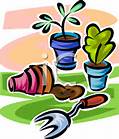September brings a change in season as autumn approaches, the leaves start to turn golden and the temperature starts to drop. There’s plenty to keep you busy in the garden this month.
Autumn is a fantastic time of year to plant your spring bulbs, feed your lawn or prepare for your winter vegetable planting. Buy spring bulbs and plant bulbs for colour at Christmas and spring, dead head roses as the plants will still give dead heads nutrients that could go into new flowers, give your lawn some tender loving care by raking, aerating and feeding with an autumn lawn fertiliser or its time to sow or lay new lawns.
As the temperature drops, it’s a good idea to protect border plants by mulching (organic mulches include formerly living material such as chopped leaves, straw, grass clippings, compost, wood chips, shredded bark, sawdust, pine needles, and even paper). It’s best to apply when the soil is damp or wet and make sure you weed first. It will help your soil from drying out, improve its texture and help protect the roots of tender plants such as dahlias or Verbena bonariensis (purpletop) from frost. A good two inch layer is best. There should always be room in your garden somewhere for a compost bin and don’t forget the woody materials too.
If you have violas, now is the time to take cuttings and start to bring those tender plants in from the garden. September is a great month for collecting seeds for next year now the flowers have gone over and the seed heads formed and dried. Extend the colour through to the end of the season with plants such as chrysanthemum, aster, daisy and sedum. You can also start to divide up large border perennials as the temperature cools to fills gaps next year. Don’t forget to water them in though.
Tomatoes and outdoor lettuce should be in abundance and the winter vegetables should really be coming into their own. Leeks, swede and parsnips should be almost ready to pull. Enjoy curly kale and cavolo nero for that first taste of delicious brassicas. Late crop potatoes should be out away from the slugs and the greenhouse prepared ready for autumn crops such as hardy lettuce and try a late crop of French beans. Make room in your greenhouse and pot up your parsley, mint and chives and they will keep growing over winter. Protect your fuchsias and pelargoniums and water sparingly over the winter months.
Lastly you must take time for your garden to bring you joy! Gardening and your garden can be a great help in ensuring that not just your physical but your mental health is looked after. Stop, look and listen to what is going on and just enjoy what you have created with the help of nature. Big or small, it doesn’t matter as long as you can enjoy what you have.
Alan Caswell

 RSS Feed
RSS Feed
